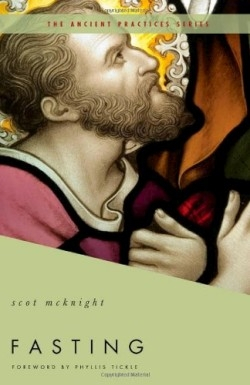Fasting
The Ancient Practices Series
It is love for God that calls one to endure the physical discipline of fasting, and that same love which fills one’s Sabbath rest with delight. Lacking that love, these spiritual disciplines would be devoid of meaning, mere physical responses to some overwhelming, body-shocking event (fasting), or a simple break from overwork and exhaustion (rest). Properly understood and placed within the context of relationship with the Divine, each is a powerful, unifying practice that strengthens, enlivens, and delights body, mind, soul, and spirit. But the dualistic mindset of the twenty-first-century world places body and spirit at war with each other, fragmenting the Eikon (the image of God) that human beings were meant to reflect. Perhaps, these volumes suggest, this is why neither fasting nor the keeping of the Sabbath are much understood or appreciated today, even by those who consider themselves to be religious or spiritual. Scot McKnight’s Fasting and Dan Allender’s Sabbath, both part of Thomas Nelson’s Ancient Practices series, couple historical perspective with modern insight, showing the practices to be as valid, helpful, and indeed, necessary today as they were in the ancient world.
“Fasting is the natural, inevitable response of a person to a grievous sacred moment in life”; it is a “choice not to eat for a designated period because some moment is so sacred that partaking in food would deface or profane” its seriousness. With these statements, Dr. Scot McKnight, professor of Religious Studies at North Park University in Chicago and a widely-recognized authority on the New Testament, early Christianity, and the historical Jesus, places the ancient practice of fasting within reach of twenty-first-century Western understanding.
No one is spared moments of grief so overwhelmingly painful that the very thought of food creates nausea; here there is no choice—the body’s natural response to such an event is to reject food for a time. However, some may choose to fast be-cause of an intense desire to give the self fully to a moment or task, the sacredness of which is palpable. Fasting then “brings the body and spirit back together” in a way that is focused and without distraction.
Dr. McKnight suggests that re-joining the material to the immaterial results in the “embodied” faith of one who is completely human, yet whose very countenance radiates Divine awareness. Fasting, for such a person, is not “instrumental,” an attempt to “get something” from God, it is rather a participation in the mind of God in relation to a grievous sacred event, a yielding of the whole person—body, soul, spirit, heart, and mind—to a clear, focused encounter with Divine reality, and com-ing to know that such union is all that was desired.
Reviewed by
Kristine Morris
Disclosure: This article is not an endorsement, but a review. The publisher of this book provided free copies of the book to have their book reviewed by a professional reviewer. No fee was paid by the publisher for this review. Foreword Reviews only recommends books that we love. Foreword Magazine, Inc. is disclosing this in accordance with the Federal Trade Commission’s 16 CFR, Part 255.

